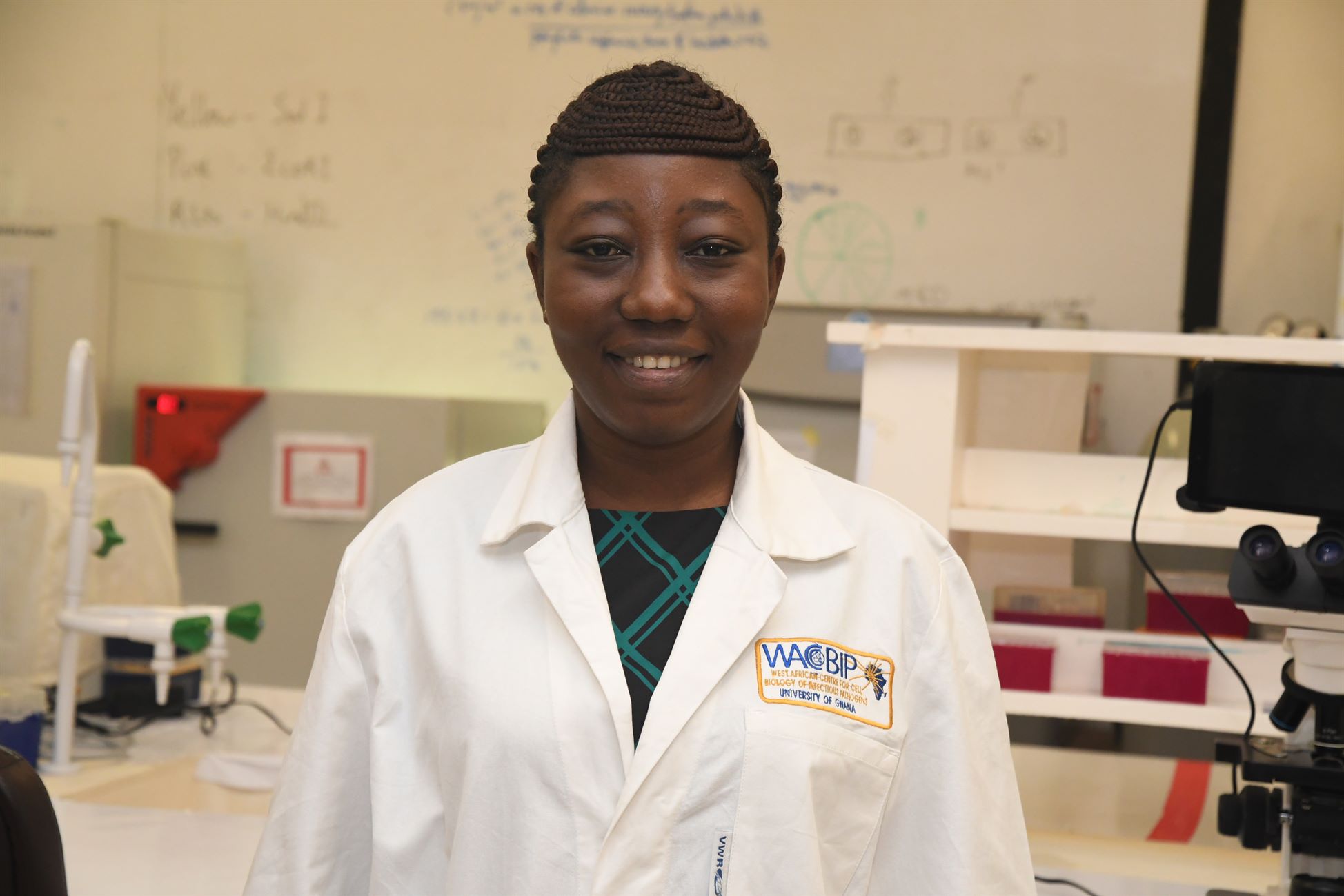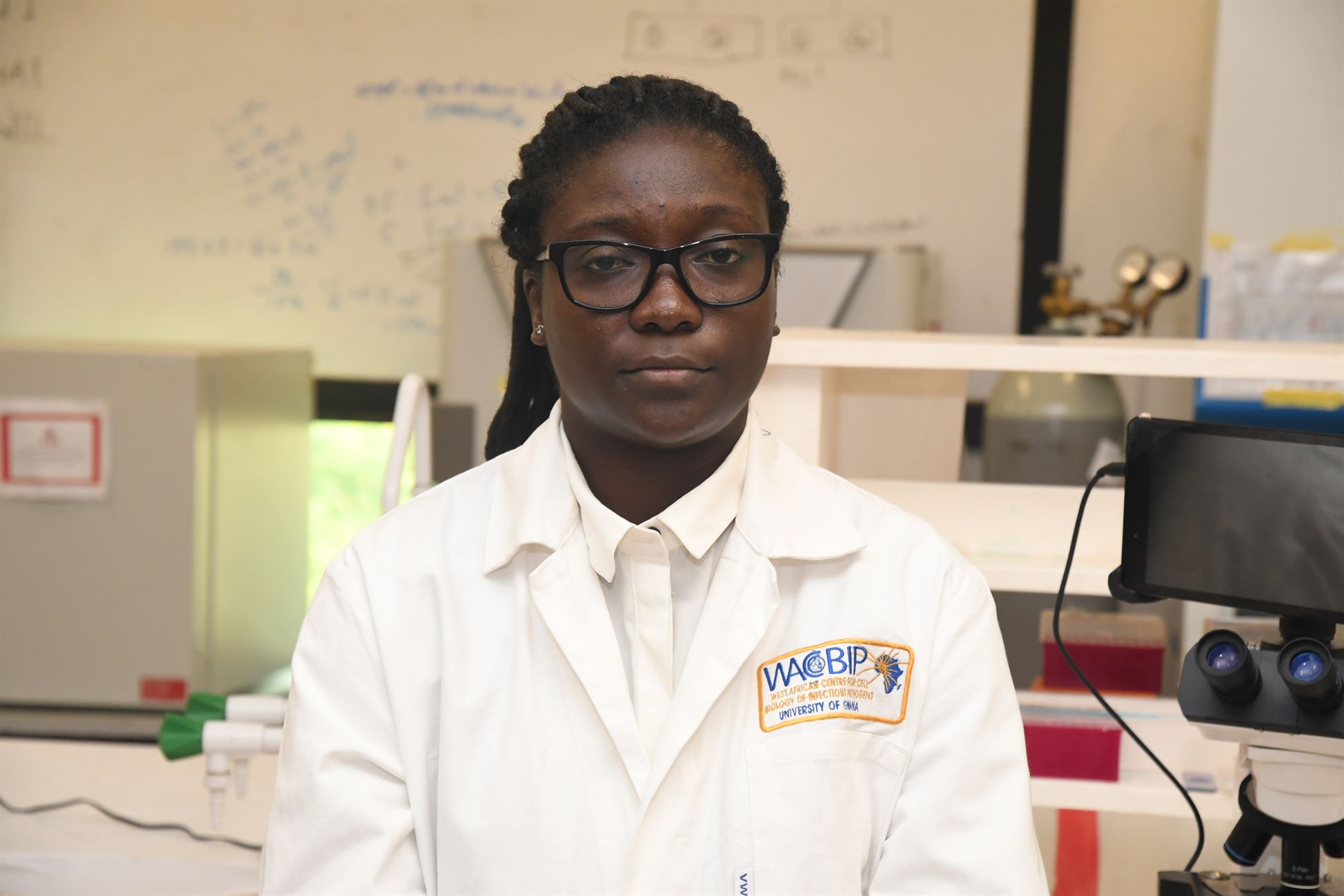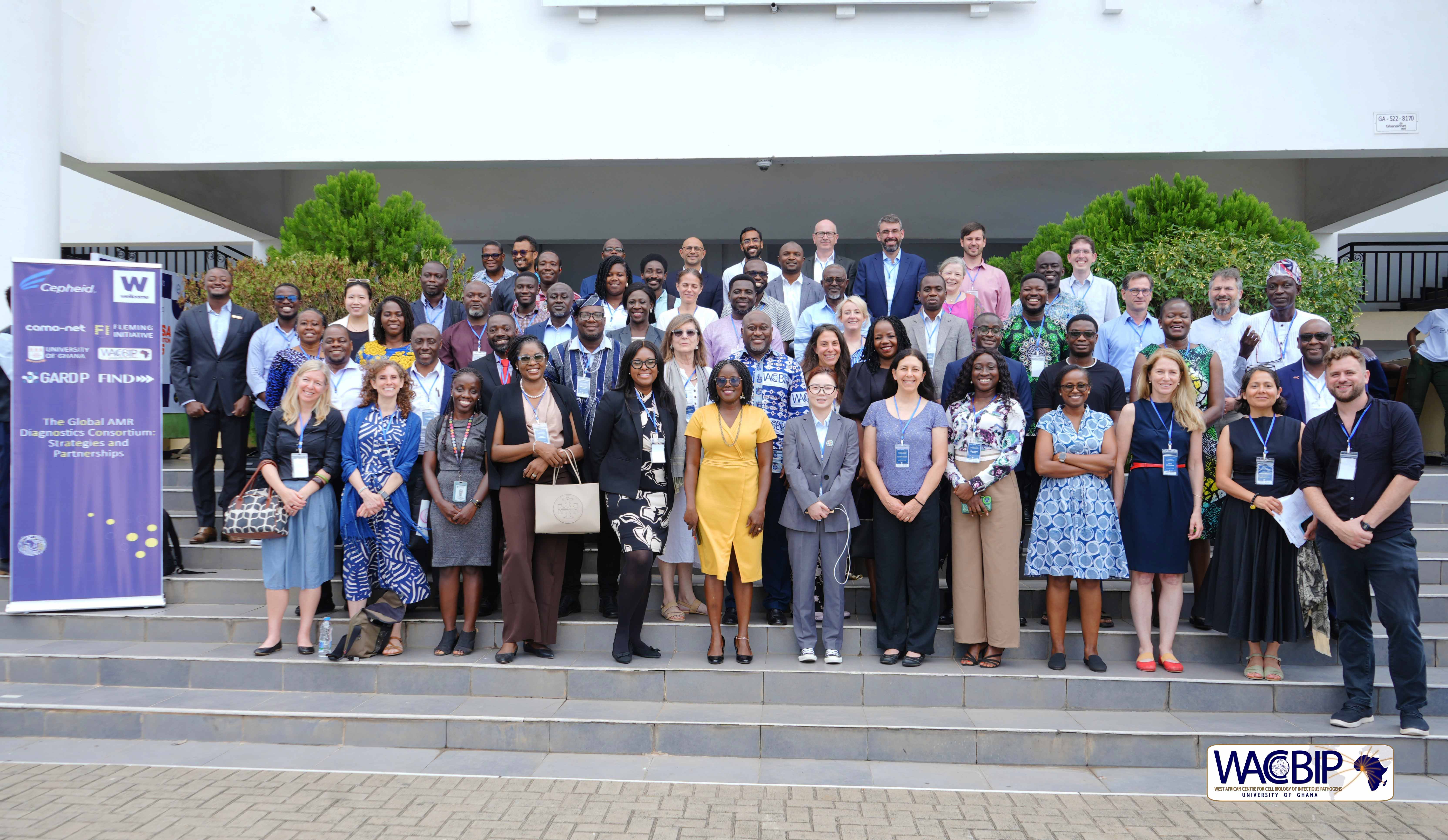GWIRA RESEARCH GROUP
The group focuses on genotyping of trypanosomes from naturally infected cattle and tsetse flies in collaboration with researchers at the Ghana Tsetse and Trypanosomiasis Control Unit (T&TCU).
There is also focus on the molecular and cellular biology of parasites, and host-pathogen interactions with a special interest in the kinetoplastid parasites - Trypanosomes and Leishmania by using different methods and technologies in molecular genetics and biochemistry, including transgenic cloning, protein expression and purification, single gene and genome-based expression assays, transcriptome analysis (including high-throughput RNA sequencing) and microscopy.
ABOUT THE GROUP
Dr. Theresa Manful Gwira became a faculty of the University of Ghana in 2012 after she obtained her PhD from the University of Heidelberg, Germany. She won the Leverhulme Royal Society African Award in 2013 to characterise lifetime infections with trypanosomes in Ghana, her first grant that awarded her the benefits of having her first Ph.D. student. She has gone on to receive other co-grants from the Cambridge Africa Alborada Research Fund and the Willowcraft Foundation. The research group is currently made up of 3 PhD students, 3 MPhil students and a research assistant.
The group focuses on protozoan diseases, specifically trypanosomiasis, leishmaniasis and babesiosis. Our main interest is to characterize the trypanosome parasites causing infections in naturally infected livestock, especially cattle, in order to identify new drug targets and their modes of action against the trypanosomes, as well as identify certain molecular, biochemical and immunological parameters peculiar to the infection in order to aid in a diagnosis of the disease. The group also seeks to explore all possible drug resistance mechanisms of trypanosomes against the existing therapeutic and prophylactic drugs used in treatment, and identify novel immunogenic proteins that can be used as possible vaccine candidates.
Animal African Trypanosomiasis (AAT) is a major vector-borne disease that affects livestock production in sub-Saharan Africa, particularly cattle production. The disease is caused by extracellular flagellate protozoan trypanosomes. AAT is implicated to cause annual losses of more than US$ 5 billion through direct and indirect agricultural production losses. The prevalence of AAT in Ghana ranges from 5 – 50%. In West Africa, little is known about the nature of infection over the lifetime of a cow or how the pattern of lifetime infection is affected by the environment. One of our research is on genotyping of trypanosomes from naturally infected cattle and tsetse flies in collaboration with researchers at the Ghana Tsetse and Trypanosomiasis Control Unit (T&TCU). Another focus of our research is on the molecular and cellular biology of parasites, and host-pathogen interactions with a special interest in the kinetoplastid parasites - Trypanosomes and Leishmania by using different methods and technologies in molecular genetics and biochemistry, including transgenic cloning, protein expression and purification, single gene and genome-based expression assays, transcriptome analysis (including high-throughput RNA sequencing) and microscopy.
Lab Structure

Dr. Theresa Manful Gwira
Group Members

Pearl Ihuoma Osirike

Ademolue Temitayo Samson

Cynthia Amisigo

Gabriella Ama Amoakoma Essuman

Christine Achiaa Antwi

Fernande Amandine Mbamba Magra
- Cambridge-Africa Alborada Research Fund, Gene expression profiling and in vitro culturing of field isolates of African trypanosomes from natural cattle infections in Ghana , £19,968.80 , March 2020 – February 2021) No cost Extension to December 2021
- World Bank, USA, West African Centre for Cell Biology of Infectious Pathogens (WACCBIP), $6,000,000, November 2019 – December 2024.
- Academy of Medical Sciences, TsetseNET: Developing scientific capacity through an interdisciplinary international network for tsetse fly research, £23,600, March 2019 -February 2020
- Willowcroft Foundation Grant, USA, Characterization of wild trypanosome coats towards the development of an animal African trypanosomiasis vaccine, $50,000, July 2017 – June 2019
- Africa- Oxford grant, Understanding the mode of action of anti-trypanosome veterinary drugs, £2,920, September 2016 – August 2017
- Leverhulme-Royal Society Africa Award , Characterization of trypanosome infections over the lifetime of cattle in Ghana, £160,300, September 2013 - August 2017
- World Bank, USA, West African Centre for Cell Biology of Infectious Pathogens (WACCBIP) Grant ref: ACE:002, $8,000,000, February 2014 – December 2018
- Cambridge-Africa Alborada Research Fund, The epidemiology of lifetime infections with trypanosomes in individual cattle in Ghana, £11,400, June 2013 – February 2014
- CAPREx Postdoctoral Research Fellowship, Characterization of lifetime infection with trypanosome in cattle in Ghana, £10,000, October 2013 - January 2014
- Manful, T. (2014). Trypanomatids: Biology, Impact of disease and Control. Molecular approaches to understanding life and disease. (pp. 135-144). Tema, Ghana: Digibooks Ghana Ltd.
- Manful, T (2014). Understanding disease through genomics and transcriptomics. Molecular approaches to understanding life and disease. (pp. 105-115). Tema, Ghana: Digibooks Ghana Ltd.
Published research work in refereed journal
- Twumasi, E. B., Akazue, P. I., Kyeremeh, K., Gwira, T. M., Keiser, J., Cho-Ngwa, F., Flint, A., Anibea, B., Bonsu, E. Y., Amewu, A. K., Amoah, L. E., Regina Appiah-Opong, R. and Osei-Safo, D. (2020). Antischistosomal, antionchocercal and antitrypanosomal potentials of some Ghanaian traditional medicines and their constituents. PLoS Negl Trop Dis. 14(12); e0008919
- Dofuor, K., Ayertey, F., Bolah, P., Djameh, G. I., Kyeremeh, K., Ohashi, M., Laud Kenneth Okine, L. K. and Gwira, T. M. (2020). Isolation and Antitrypanosomal Characterization of Furoquinoline and Oxylipin from Zanthoxylum zanthoxyloides. Biomolecules, 10(12), 1670
- Amlabu, W. E., Antwi, C.A., Awandare, G. and Gwira T. M. (2020). Elucidating the possible mechanism of action of some pathogen box compounds against Leishmania donovani. PLoS Negl Trop Dis. 14(4):e0008188 doi:10.1371/journal.pntd.0008188
- Thiam, L. G., Aniweh, Y., Quansah, E. B., Donkor, J. K., Gwira T. M.,Kusi, K. A., Niang, M. and Awandare, G. A. (2020). Cell trace far-red is a suitable erythrocyte dye for multi-color Plasmodium falciparum invasion phenotyping assays. Experimental Biology and Medicine; 0: 1–10. DOI: 10.1177/1535370219897393
- Dofuor, A. K., Kwain, S., Osei, E., Tetevi, G. M., Okine, L. K., Ohashi, M., Gwira, T. M. and Kyeremeh, K. (2019). N-(Isobutyl)-3,4-methylenedioxy Cinnamoyl Amide. Molbank M1070; doi:10.3390/M1070.
- Dofuor, A. K., Djameh, G. I., Ayertey, F., Peter Bolah, Amoa-Bosompem, M., Kwaku Kyeremeh, Okine, L. K., Gwira, T. M. and Ohashi, M. (2019). Antitrypanosomal effects of Zanthoxylum zanthoxyloides (Lam.) Zepern. & Timler 1 extracts on African trypanosomes. Evidence-Based Complementary and Alternative Medicine. Volume 2019, Article ID 1730452, 14 pages. doi.org/10.1155/2019/1730452
- Amisigo, C. M., Antwi, C. A, Adjimani, J. P. and Gwira, T. M. (2019). In vitro anti-trypanosomal effects of selected phenolic acids on Trypanosoma brucei. PLoS ONE 14(5): e0216078. https://doi.org/10.1371/journal.pone.0216078
- Antwi, C. A, Amisigo, C. M., Adjimani, J. P. and Gwira, T. M. (2019). In vitro activity and mode of action of phenolic compounds on Leishmania donovani. PLoS Negl Trop Dis, 13(2), pp e0007206.
- Tuffour, I., Ayi, I., Gwira, T. M., Dumashie, E., Ashong., Y. and Appiah-Opong, R. (2018). Schistosoma Egg Antigen Induces Oncogenic Alterations in Human Prostate Cells. Analytical Cellular Pathology. Volume 2018, Article ID 4675380, 10 pages DOI:10.1155/2018/4675380
- Azerigyik, F. A., Amoa-Bosompem, M., Tetteh, T., Ayertey. F., Ama Nyamekye Antwi, A. N., Owusu, K. B-A., Kofi Kwofie Dadzie, K. K., Djameh, G. I., Tetteh-Tsifoanya, M., Iwanaga, S., Appiah, A. A., Ohta, T., Uto, T., Shoyama, Y., Ohta, N., Gwira, T. M. and Ohashi, M. (2018). In vitro Mechanistic Assays of Tetracyclic Iridoid Compounds Isolated from Morinda lucida Benth in Leishmania European Journal of Medicinal Plants. 25(4): 1-14. DOI: 10.9734/EJMP/2018/44972
- King, S. A., Onayifeke, B., Akorli, J., Sibomana, I., Chabi, J., Gwira, T. M.,Dadzie, S., Suzuki, T., Wilson, M. D., Boakye, D. A. & de Souza, D. K. (2017). The Role of Detoxification Enzymes in the Adaptation of the Major Malaria Vector Anopheles gambiae (Giles; Diptera: Culicidae) to Pollute Water, Journal of Medical Entomology, September 2017, DOI:10.1093/jme/tjx164
- Kusi, K. A., Manu, E. A., Gwira, T. M.,Kyei-Baafour, E., Dickson, E., Amponsah, J. A., Remarque, E. J., Faber, B. W., Kocken, C. H. M., Dodoo, D., Gyan, B. A., Awandare, G. A., Atuguba, F., Oduro, A. R. & Koram, K. A. (2017). Variations in the quality of malaria-specific antibodies with transmission intensity in a seasonal malaria transmission area of Northern Ghana. PLoS One. 12(9): e0185303. doi: 10.1371/journal.pone.0185303.
- Bakari, S. M., Ofori, J. A., Kusi, K. A., Aning, G. K., Awandare, G. A., Carrington, M. &Gwira, T. M. (2017). Serum biochemical parameters and cytokine profiles associated with natural African trypanosome infections in cattle Parasites & Vectors 2017 10:312 DOI: 1186/s13071-017-2255-9
- Colasante, C., Voncken, F., Manful, T., Ruppert, T., Tielens, A. G. M., van Hellemond, J. J. & Clayton, C. (2013). Proteins and lipids of glycosomal membranes from Leishmania tarentolae and Trypanosoma brucei [v1; ref status: approved 1, http://f1000r.es/x1] F1000Research 2:27 (doi: 10.3410/f1000research.2-27. v1)
- Ouna, B., Nyambega, B., Manful, T., Fadda, A., Helbig, C., Males, M. & Clayton, C. (2012). Depletion of trypanosome CTR9 leads to a lethal cascade of gene expression defects. PLoS One 7(4): e34256. doi:10.1371/journal. pone.0034256
- Manful, T., Fadda, A. & Clayton, C. (2011). The role of the 5’-3’ exoribonuclease XRNA in transcriptome-wide mRNA degradation. RNA 17: 2039-2047
- Armah, G. E., Hoshino, Y., Santos, N., Binka, F., Damanka, S., Adjei, R., Honma, S., Tatsumi, M., Manful, T. & Anto, F., (2010). The Global Spread of Rotavirus G10 Strains: Detection in Ghanaian Children Hospitalized with Diarrhea. J Infect Dis. 202, 231–238
- Manful, T., Mulindwa, J., Frank, F., M., Clayton, C. E. & Matovu, E. (2010). A Search for Trypanosoma brucei rhodesiense Diagnostic Antigens by Proteomic Screening and Targeted Cloning. PLoS ONE 5(3): e9630. doi:10.1371/journal.pone.0009630
- Schwede, A., Manful, T., Jha, B. A., Helbig, C., Bercovich, N., Stewart, M. & Clayton, C. (2009). The role of deadenylation in the degradation of unstable mRNAs in trypanosomes. Nucleic Acids Res 37, 5511-5528
- Manful, T., Cristodero, M. & Clayton, C. (2009). DRBD1 is the trypanosome homologue of the spliceosome-associated protein 49. Mol. Biochem. Parasitol. 166, 186-189





